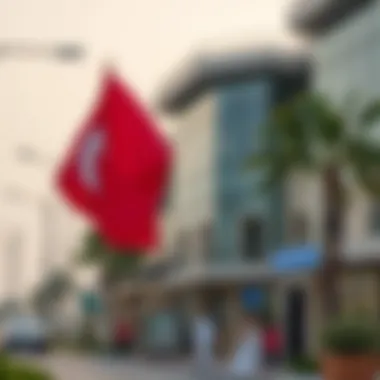Understanding Public Holidays in the UAE


Intro
With an increasingly globalized economy, public holidays in the UAE do not just serve as days of rest and celebration. They also play a significant role in shaping consumer behavior and business activity. For instance, the influx of tourists during holiday seasons often leads to spikes in rental prices, particularly in sought-after areas. Moreover, local traditions tied to these holidays can influence property investments, making it essential for stakeholders to have a solid grasp of how these holidays might affect market trends.
In this article, we will delve into the multitude of public holidays celebrated across the UAE, examine their historical and cultural significance, and discuss their potential impact on various sectors, specifically the real estate market. This exploration will clarify how holiday observances shape market dynamics and influence investment opportunities.
The journey will cover trends in property prices and rental markets, evaluate emerging investment opportunities, and identify neighborhoods where one might consider putting down roots or expanding a portfolio. With a focus on the economic aspects of these holidays, we aim to provide comprehensive insights that will inform decisions and strategic planning in the vibrant UAE real estate sphere.
Prologue to Public Holidays in the UAE
In light of a rapidly evolving economic landscape, understanding public holidays becomes not just beneficial but necessary. For instance, during Eid al-Fitr or National Day, one can expect shifts in market dynamics, as consumer behavior tends to drain away from regular patterns. Investors and businesses should keep these fluctuations in mind when planning their strategies. As we delve into this article, we will explore the myriad types of public holidays in the UAE, shedding light on their implications for various sectors and how they are celebrated across the nation.
Overview of Public Holidays
The public holiday calendar in the UAE is rich and varied, comprising both secular and religious observances. Each holiday carries unique significance and is celebrated in distinctive ways that reflect the rich heritage of the Emirates. For instance, National Day celebrated on December 2 marks the unification of the seven emirates, while Eid al-Fitr signifies the end of Ramadan, a holy month of fasting and reflection.
Holidays like Commemoration Day serve to honor the sacrifices of fallen soldiers, showcasing a deep respect for history, while others foster community spirit and togetherness. This range of holidays not only emphasizes the cultural plurality within the UAE but also serves as a reminder of collective values binding the nation together.
Significance of Holidays in Emirati Culture
Holidays in the UAE provide insight into the broader Emirati culture, intricately linked to Islamic beliefs and traditions. They act as a bridge connecting the past with the present, allowing citizens and residents to partake in meaningful rituals that have been observed for generations.
- Cultural Reflection: Each holiday encapsulates elements of Emirati identity, such as hospitality, generosity, and community cohesion.
- Family Values: Many holidays encourage family gatherings and strengthen familial bonds, enhancing the social foundation of society.
- Economic Activities: The festive seasons boost tourism and retail activities, contributing significantly to the economy.
"Celebrating public holidays in the UAE, while a joyous occasion, also acts as a moment of reflection on collective history and identity."
The essence of these holidays is not only in their celebration but in their ability to bring people together and foster a sense of belonging, making them integral to understanding the Emirati way of life.
Types of Public Holidays
Understanding the Types of Public Holidays is essential, particularly for investors, homebuyers, realtors, renters, and analysts interested in the UAE's evolving marketplace. These holidays can impact various sectors, from retail to hospitality, and even the real estate market. Knowing when specific holidays occur helps investors anticipate changes in marketplace activity, including potential surges in demand during peak holiday seasons.
Official Public Holidays
Official public holidays in the UAE are designated by the government and, typically, these days are marked on official calendars across the emirates. These holidays often align with important historical events, religious observances, and the nation's cultural heritage. Here’s a snapshot:
- New Year's Day: January 1, celebrates the beginning of the Gregorian calendar year. While not deeply rooted in Emirati culture, it serves as an opportunity for celebrations and family gatherings.
- Eid al-Fitr: The festival marking the end of Ramadan, when fasting comes to a close. The date varies each year, depending on lunar sightings. It's a time for family, prayer, and generosity.
- Eid al-Adha: Known as the "Festival of Sacrifice," it honors the willingness of Ibrahim to sacrifice his son in obedience to God. This holiday also includes community feasts and charitable acts.
- National Day: Celebrated on December 2, this day commemorates the unification of the emirates in 1971. It’s a day filled with patriotic celebrations, parades, and fireworks.
Official public holidays play a pivotal role in shaping the rhythm of business in the UAE. During these periods, many entities close their operations, leading to a notable pause in economic activity. For those looking to invest, understanding the timing and implications of these holidays can be crucial in devising strategies for market entry or expansion.
Cultural and Religious Observances


Cultural and religious observances enrich the tapestry of life in the UAE. Beyond official holidays, various cultural festivities are recognized and celebrated throughout the country. These observances transcend mere dates on a calendar; they represent the values, beliefs, and communal spirit of the Emirati populace. Here are some to consider:
- Islamic New Year: Marked by reflection and prayer, it signifies the start of the new Islamic lunar calendar. While not a public holiday in the strictest sense, it is observed with solemnity by many.
- Prophet Muhammad’s Birthday: Commonly known as Mawlid, this day is a time for reflection and religious gatherings, focusing on the teachings of Prophet Muhammad.
- Commemoration Day: Observed on November 30, this day honors Emirati martyrs who sacrificed their lives for the nation. It's a day filled with remembrance and gratitude for their dedication.
In addition to the above, various local festivals and traditions may be celebrated in different emirates, showcasing the unique cultural diversity that exists within the UAE. Understanding these observances not only enhances cultural literacy but also offers potential opportunities for businesses looking to engage authentically with the community.
In summary, the Types of Public Holidays in the UAE serve as a barometer for socio-economic dynamics, influencing everything from consumer behavior to real estate trends. Being mindful of these holidays allows for better planning and strategic alignment with the UAE's unique cultural landscape.
"Public holidays in the UAE aren't just days off; they're a vital part of the cultural tapestry. Recognizing these dates can lead to valuable insights for anyone looking to understand the market dynamics."
For further reading on the history and significance of public holidays, you can visit: Wikipedia - Public Holidays in the UAE for comprehensive details.
Key Public Holidays Explained
Independence Day
Independence Day, celebrated on December 2nd, stands tall as a beacon of pride for the UAE. It commemorates the day in 1971 when the emirates united to form the country we know today. The day is filled with parades, fireworks, and a palpable sense of national pride. This celebration not only honors the past but also unifies families and communities in understanding their shared journey. For investors and renters, engaging in festivities can provide networking opportunities, as community bonds often strengthen during this time.
Eid al-Fitr
Eid al-Fitr marks the end of Ramadan, the holy month of fasting. The holiday's timing depends on the lunar calendar, meaning it changes each year. Observed with much fervor, Eid is a time for family gatherings, special prayers, and festive meals. The cultural significance cannot be understated; it's about gratitude and sharing blessings with the less fortunate. For the housing market, expect a wave of activity as families often prefer to make new housing decisions following this holiday period, seeking fresh starts and new beginnings.
Eid al-Adha
Eid al-Adha, or the Festival of Sacrifice, is another pivotal occasion observed by Muslims worldwide. Its observance takes place approximately 70 days after Eid al-Fitr. It's a time of reflection, charity, and communal prayers, reinforcing the values of family and community. Many people travel to their home emirates, causing a temporary spike in demand for accommodations. Hence, real estate agents must be vigilant during this period as trends can shift swiftly.
Islamic New Year
Islamic New Year, also known as Hijri New Year, is recognized as the first day of Muharram, which is the first month in the Islamic lunar calendar. While it is observed less festively than Eid, it is a day of reflection and planning for the year ahead. Understanding this holiday can offer insights into consumer spending habits and preferences for the coming months, as individuals often look to improve their living situations.
Prophet Muhammad’s Birthday
Celebrated on the 12th day of Rabi al-Awwal in the Islamic calendar, the Prophet Muhammad's Birthday, or Mawlid, is a moment where many reflect on his teachings and contributions. Activities may include reciting poetry, attending lectures, or hosting communal meals. While it may not directly affect the real estate market, the atmosphere of community and togetherness can influence buyer sentiment positively.
Commemoration Day
Commemoration Day, observed on November 30th, is dedicated to honoring the sacrifices of Emirati martyrs who have fought for the country. The day is observed with poignant ceremonies and tributes throughout the nation. Such observance fosters national loyalty and pride. For investors, this day can highlight sentiments regarding national stability and security, which directly correlate to market confidence.
National Day
Every December 2nd, National Day celebrations transform the UAE into a vibrant tapestry of colors, lights, and life. From fireworks to cultural displays, the day embodies Emirati heritage and future aspirations. For residents and investors, understanding the nuances of this holiday can aid in recognizing peak times for buying or renting, as many view it as a marker for new initiatives and potential market shifts in the real estate sector.


Public holidays in the UAE offer a window not just into the cultural ethos but also into economic patterns that can influence many sectors, especially real estate.
By grasping the profound significance of these holidays, investors, renters, and homebuyers can make more informed decisions that resonate with the rhythm of Emirati life.
Holiday Observance and Traditions
Understanding the holiday observance and traditions in the United Arab Emirates is crucial for grasping the broader cultural context and social dynamics at play in this vibrant nation. With an intricate blend of various cultural practices stemming from its diverse population, the UAE showcases a rich tapestry of traditions that not only celebrate religious significance but also foster a sense of unity and communal belonging. This section delves into the core aspects of holiday celebrations and how they symbolize both historical roots and modern interpretations.
Traditional Celebrations
Traditional celebrations during public holidays in the UAE are deeply rooted in the local customs and the fabric of Emirati identity. During holidays like Eid al-Fitr and Eid al-Adha, families come together for communal prayers, feasting, and giving back to the less fortunate, embodying the spirit of charity that Islam emphasizes.
These occasions see streets lined with festive lights and vibrant decorations, resembling a feast for the eyes. It’s not uncommon to find traditional dishes such as machboos and shawarma being served, as well as sweets like qamar al-din and kunafa that further enhance the celebratory spirit. Families often don their best attire, evoking feelings of pride and cultural pride.
"In every culture, the act of gathering around food serves as a powerful reminder of shared bonds and traditions."
During National Day, celebrations transform into nationwide festivities, with parades, fireworks, and colorful displays symbolizing the unification of the emirates. Schools, communities, and government entities actively participate, reinforcing the essence of belonging and national pride. These gatherings are not merely events; they encapsulate generations of history and the aspiration of a nation moving forward.
Modern Interpretations of Holidays
In recent years, the observance of public holidays in the UAE has seen a shift towards more modern interpretations that cater to a rapidly evolving society. While traditional values remain at the core, contemporary influences have crept into holiday festivities, portraying flexibility and adaptation in celebrations.
For instance, Eid celebrations are now often marked by the incorporation of technology, where families might engage with virtual platforms to connect globally, sharing festivities with loved ones far away. This has been particularly resonant amid recent global events that emphasized social distancing.
Moreover, social media plays a pivotal role in amplifying holiday cheer, with platforms like Instagram and Facebook flooded with posts showcasing personal celebrations or community events. The hashtag phenomenon has made it easier for people to share their unique experiences and foster a sense of virtual community.
Merchants and businesses have also adapted by offering special promotions and innovative experiences during the holidays, encouraging consumers to explore local attractions and festivities. For example, leisure destinations unveil themed events to draw in residents and tourists alike, bridging the gap between tradition and modern entertainment.
In summary, the observance of public holidays in the UAE serves not just as a reminder of cultural richness but also reflects an evolving identity that embraces both its heritage and contemporary influences. By acknowledging these changes, investors, homebuyers, realtors, and renters can better understand the connections between cultural practices and the real estate landscape, ultimately enabling them to make informed decisions amidst a dynamic market.
Impact of Public Holidays on the Economy
Business Operations During Holidays
During holidays, many businesses adjust their operations significantly. The closure of offices and reduction in working hours can lead to a slowdown in productivity, yet it can also provide a much-needed respite for employees.
- Retail Sector: Companies often launch promotions and discounts during public holidays, expecting increased foot traffic. Retailers such as Carrefour and Lulu Hypermarket capitalize on shopping spikes, particularly during Eid celebrations. However, inadequate staffing over peak holiday times can lead to lost sales opportunities.
- Real Estate Transactions: The real estate market experiences fluctuations around holidays. Buyers and renters may be less inclined to finalize deals during these periods. However, afterward, there is often a surge as people return to the market with renewed focus post-holiday.
- Hospitality Services: Many hotels and restaurants thrive during public holidays, offering special packages to attract local residents and tourists. This can lead to a temporary spike in revenue, benefiting various stakeholders, from service staff to suppliers.
Overall, businesses must carefully balance holiday schedules and operations to not miss out on potential gains while ensuring continuity in service.
Tourism and Seasonal Activities


Public holidays offer a unique window into the tourism dynamics of the UAE. With events like Eid and National Day, the UAE sees a flurry of activity that impacts local and international tourism.
- Increased Tourist Influx: Major holidays often coincide with peak travel seasons. For instance, Dubai's elaborate fireworks displays for National Day attract both domestic and international tourists, leading to fully booked hotels and packed restaurants. This influx directly supports the hospitality and entertainment sectors, facilitating economic stability and growth.
- Cultural Exhibitions and Events: The UAE capitalizes on its diverse culture during holidays. Events like heritage festivals during Eid or National Day celebrations boost cultural tourism. Visitors often engage with Emirati traditions which not only enhances their experience but promotes a positive image of the UAE on the global stage.
- Seasonal Activities: The holidays also present opportunities for seasonal activities ranging from outdoor fairs to music festivals that draw considerable crowds. Cities such as Abu Dhabi and Dubai spend substantial resources organizing these events, anticipating a return on investment through heightened tourism.
In summary, the intersection of public holidays and the tourism sector is a crucial consideration for investors. Understanding these patterns enables stakeholders to strategize effectively for maximizing returns and enhancing the overall guest experience.
“Public holidays are not just days of rest; they represent opportunities for businesses and communities to unite in celebration, economic interests, and cultural engagement.”
In light of this, an ongoing evaluation of how public holidays affect the economy remains essential for stakeholders across various sectors, especially with the evolving demographic landscape of the UAE.
Public Holidays and the Real Estate Market
Market Trends During Holidays
Market fluctuations during public holidays are not merely coincidental. Investors often witness a notable spike in market activity during certain holiday periods. Traditionally, the Eid festivals see an influx of both local and expatriate buyers looking to capitalize on time away from work to hunt for new homes or make significant purchases. For instance, during Eid al-Fitr, people often receive bonuses or gifts, which can lead to increased spending in the housing market.
Furthermore, holidays bring various promotions from real estate developers eager to attract attention. Special offers or discounts during such times—from waived fees to unique payment plans—can entice buyers to make swift decisions. The Natiional Day presents another crucial timeframe when people look for new properties, as celebrations, events, and exhibitions make the market vibrant and active.
"During holidays, the market tends to warm up, creating opportunities for those ready to act swiftly."
Investor Considerations Around Holidays
When considering investments around public holidays, a few considerations are paramount. First is the timing of investments, as observed trends suggest that certain times of the year yield better returns. It’s essential for investors to closely monitor the lead-up to these holidays. Planning purchases or launches around Eid and National Day can escalate visibility and interest. Investors may find that properties in popular residential areas or those close to festive celebrations attract higher demand.
Additionally, understanding the cultural significance of these holidays plays a vital role. For instance, Eid is a time of community and family gatherings. Therefore, larger homes or villas become sought after, presenting a window for investors to focus on family-oriented properties that could command higher sales prices or rental yields.
Finally, fluctuations in consumer sentiment during holidays need careful consideration. Potential buyers may have diverse preferences and motivations influenced by holiday spending habits. Savvy investors can leverage this by focusing marketing efforts to align with what buyers look for during festive seasons—think spacious living areas for family gatherings or properties in vibrant locales where festivities occur.
In summary, public holidays significantly influence the real estate market dynamics in the UAE. Keeping an eye on market trends during these important occasions, coupled with an understanding of cultural nuances, can provide investors with a substantial advantage.
Finale and Future Considerations
Summary of Key Insights
One cannot overlook how public holidays shape the overall stability and dynamic nature of the Emirati economy. Here are some key takeaways:
- Cultural Significance: Holidays often serve as a bridge connecting the past with the present, fostering a deeper understanding of local customs.
- Economic Impact: The fluctuations in market activities during holidays can indicate consumer sentiment and readiness to invest.
- Real Estate's Response: Observance of holidays affects property demand and rental patterns, highlighting cyclical trends that investors should monitor.
- Adaptability: Celebratory periods tends to adapt through time, responding to modern realities while keeping traditional elements alive.
In this light, stakeholders can better appreciate the intricate ties between holiday observances and the economic fabric of the UAE, making educated decisions that stand the test of time.
Potential Changes in Holiday Observance
Looking ahead, the landscape of public holidays in the UAE may be subject to changes that reflect both the evolution of the society and the economic climate. Considerations for future observance might include:
- Integration of New Holidays: With a growing expatriate population, there may be room for inclusion of holidays that resonate with diverse communities.
- Modern Traditions: As residents navigate through globalization, the traditional observance of holidays might receive a contemporary twist, blending local customs with international practices.
- Policy Changes: The government’s stance and policy adjustments can directly influence the length and types of holidays observed.
- Digital Celebrations: Given the rise of technology, even holiday celebrations may take on virtual formats, impacting how traditions are experienced.
It's essential for individuals and investors to stay ahead of these potential shifts. Keeping an ear to the ground allows for strategic planning when it comes to investing in the real estate market, and adapting to cultural trends can yield benefits that go beyond the holidays themselves.
As the UAE continues to evolve, so too will the significance of its public holidays. Staying informed is key to navigating these changes successfully.



